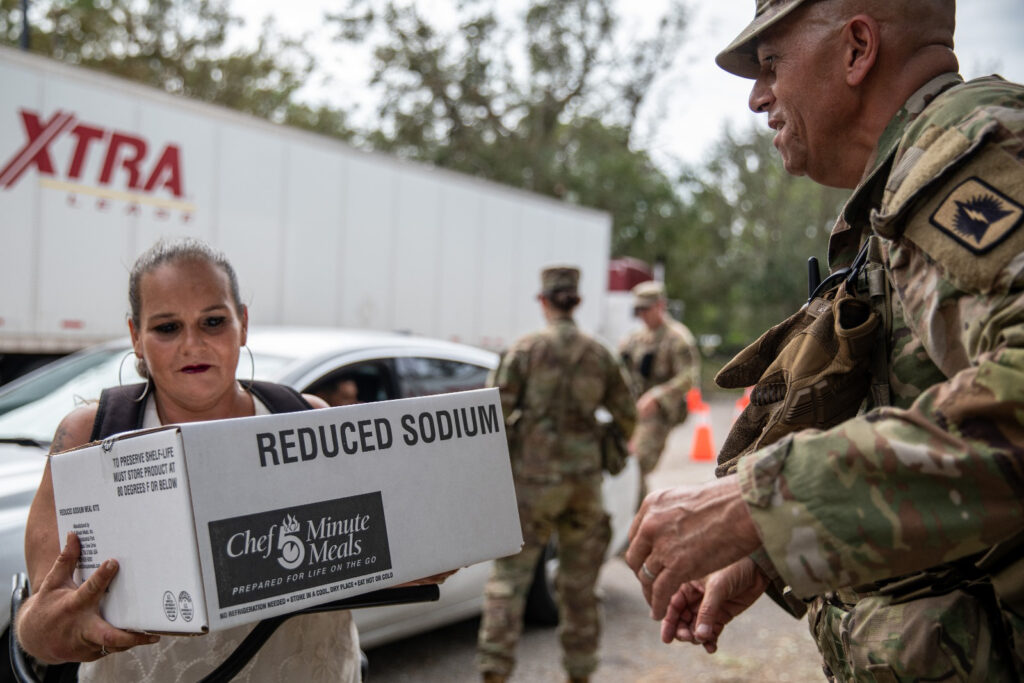By Elizabeth Dosoretz, Elite DNA Behavioral Health
Hurricanes and severe storms have always been an unwelcome (but inevitable) part of Florida living. But the increasing frequency and severity of hurricanes creates a new problem – increased anxiety and trauma in Floridians.
Storms aren’t just affecting our communities; they’re affecting our mental health.
As I watched Hurricane Milton approach Florida’s Gulf Coast, my thoughts went immediately to the detrimental mental health impacts that are likely to impact Florida residents in the days, weeks and months to come.

Residents across Southwest Florida are all too familiar with the devastation of storms following Hurricane Ian. More than two years after Ian’s impacts, people are still navigating through trauma, loss and recovery. The effects of Milton can trigger these all-too-familiar feelings of fear and anxiety yet again.
Our northern communities are continuing to put the pieces of their lives back together and are working to process their traumatic experiences following Helene.
If you’ve lived through a hurricane, it’s common to feel traumatized, fearful and vulnerable in its aftermath. You may experience a range of intense emotions, such as anxiety, depression, feelings of shock or dissociation from reality.
Weather-related incidents can trigger a natural response, called post-traumatic stress. It’s the mind’s way of protecting you. When those feelings last longer than a month or begin interfering with everyday life, it becomes a mental health concern.
Prolonged mental health impacts that are left untreated can develop into a more serious condition called post-traumatic stress disorder (PTSD).
Factors contributing to PTSD after a hurricane
People who experience particularly traumatic events, such as being trapped under debris, facing immediate life-threatening circumstances, or losing a loved one or a pet, may be at higher risk for developing PTSD.
Individuals whose home and communities were damaged or destroyed can experience added economic distress, financial strain and uncertainty that can exacerbate post-traumatic stress.
People who are already struggling with poverty, homelessness or other socioeconomic issues may be at higher risk for severe symptoms of PTSD after a hurricane. These issues can make it more difficult for individuals to prepare for and respond to a storm.
Managing stress after a hurricane
Florida’s 2024 hurricane season has been devastating for so many across our state. While it’s common to see increased reports of stress in areas hit hard by storms, it’s imperative for people who are feeling ongoing symptoms to seek professional help.
You can take immediate steps to help manage symptoms, including:

- Staying connected with others: Building and maintaining social connections can help people feel supported and connected, which may help reduce negative symptoms.
- Practicing self-care: Engaging in activities that bring joy and relaxation, such as exercise, meditation and hobbies, can help reduce symptoms and improve overall well-being.
- Limiting exposure to triggers: Limiting exposure to news and social media related to the hurricane, as well as avoiding triggers that can cause flashbacks or nightmares, can help manage symptoms.
- Seeking support from community resources: Community resources such as disaster relief organizations and support groups can provide a range of services to people impacted by a hurricane or natural disaster.
Professional approaches including talk therapy can be beneficial for individuals after a hurricane. Whether a person works 1:1 with a therapist or in a group, both options provide a safe and supportive environment for people to share their experiences and learn healthy coping strategies.
Post-traumatic stress after a hurricane is a normal reaction to witnessing a traumatic situation. Symptoms can become debilitating, but they can also be effectively managed with professional help and coping strategies.
You are not alone in your experience. Help is available.
Elizabeth Dosoretz, LCSW, is CEO and founder of Elite DNA Behavioral Health based in Fort Myers, who leads offices in Tallahassee, Gainesville and along Florida’s Gulf Coast. This opinion piece was originally published by the Tallahassee Democrat, which is a media partner of The Invading Sea.
If you are interested in submitting an opinion piece to The Invading Sea, email Editor Nathan Crabbe at ncrabbe@fau.edu. Sign up for The Invading Sea newsletter by visiting here. Banner photo: Florida Army National Guard Staff Sgt. Martin Martinez distributes food in Bradenton to assist the local community Oct. 11 following Hurricane Milton. (U.S. Army photo by Sgt. Marc Morgenstern, via Defense Visual Information Distribution Service).



